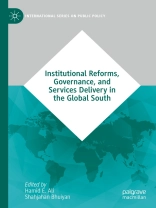This edited book explores the link between institutional reforms, governance and services delivery in the Global South, mapping how and to what extent resource-poor governments deliver public services to their citizens. The book concludes that delivery of public services responsibly and efficiently remains largely unachievable because of weaker institutions and poor quality of governance in the Global South countries. Reforms to governance and institutions are generally considered fitting measures to overcome public service delivery challenges.
İçerik tablosu
1. Introduction: Institutional Reforms, Governance and Services Delivery in the Global South.- 2. Governance and Policy Making in the Middle East and North Africa (MENA): Evidence from Using Inductive Thematic Coding.- 3. The Middle Class and Institutional Reform in Selected MENA Countries.- 4. Deinstitutionalization and Alternative Care System: A Case Study of Children without Parental Care in Egypt.- 5. Parent Maintenance Act of Bangladesh: Analysis of Its Provisions and Implementation Strategy.- 6. Trust in Top Leadership in Africa: A Search for Explanatory Factors beyond Performance and Governance Quality.- 7. Toward E-Governance in Lebanon for Better Governance and Proactive Transparency.- 8. Analysis of Social Accountability and Local Governance in Egypt during the Transition.- 9. Two-Factor Model for Public-Private Partnership (PPP): Evidence from International Experiential Learning.- 10. Governance and Service Delivery Reform in the Post-NPM Era: The Case of Malaysia’s National Blue Ocean Strategy.- 11. Public Service Delivery: Egypt’s Pre-University Education Reforms Continuing through the Pandemic.- 12. Assessment of Poverty Alleviation Policies in Assiut Governorate, Egypt.- 13. Conclusion Institutional Reform, Governance and Service Delivery in the Global South—Issues and Perspectives.
Yazar hakkında
Hamid E. Ali is Associate Professor of Economics and Public Policy and Dean of the School of Public Administration and Development Economics at the Doha Institute for Graduate Studies, Qatar, and an Associate Professor (on leave) at The American University in Cairo’s School of Global Affairs and Public Policy, Egypt. He holds an M.Sc. in Economics and a Ph D in Economics and Public Policy both from the University of Texas at Austin, USA, and is the author of Darfur Political Economy: A Quest for Development (2014) and co-author with Christos Kollias of Defense Spending, Natural Resources, and Conflict (2017). He has published in numerous scholarly journals.
Shahjahan Bhuiyan is Associate Professor of Public Administration and Associate Dean for Undergraduate Studies and Administration at The American University in Cairo’s School of Global Affairs and Public Policy, Egypt. He was previously Dean of the KIMEP University’s College of Social Sciences, Kazakhstan. Bhuiyan holds an MPhil in Public Administration from the University of Bergen, Norway, and a Ph D in Development Studies from the University of Bonn, Germany. He was a Visiting Research Fellow at Oxford University’s Oxford Institute of Population Aging (OIA) and the Inaugural Democratic Governance Fellow in UNDP’s Oslo Governance Center. He has published in numerous scholarly journals and has authored, edited, or contributed to books.












